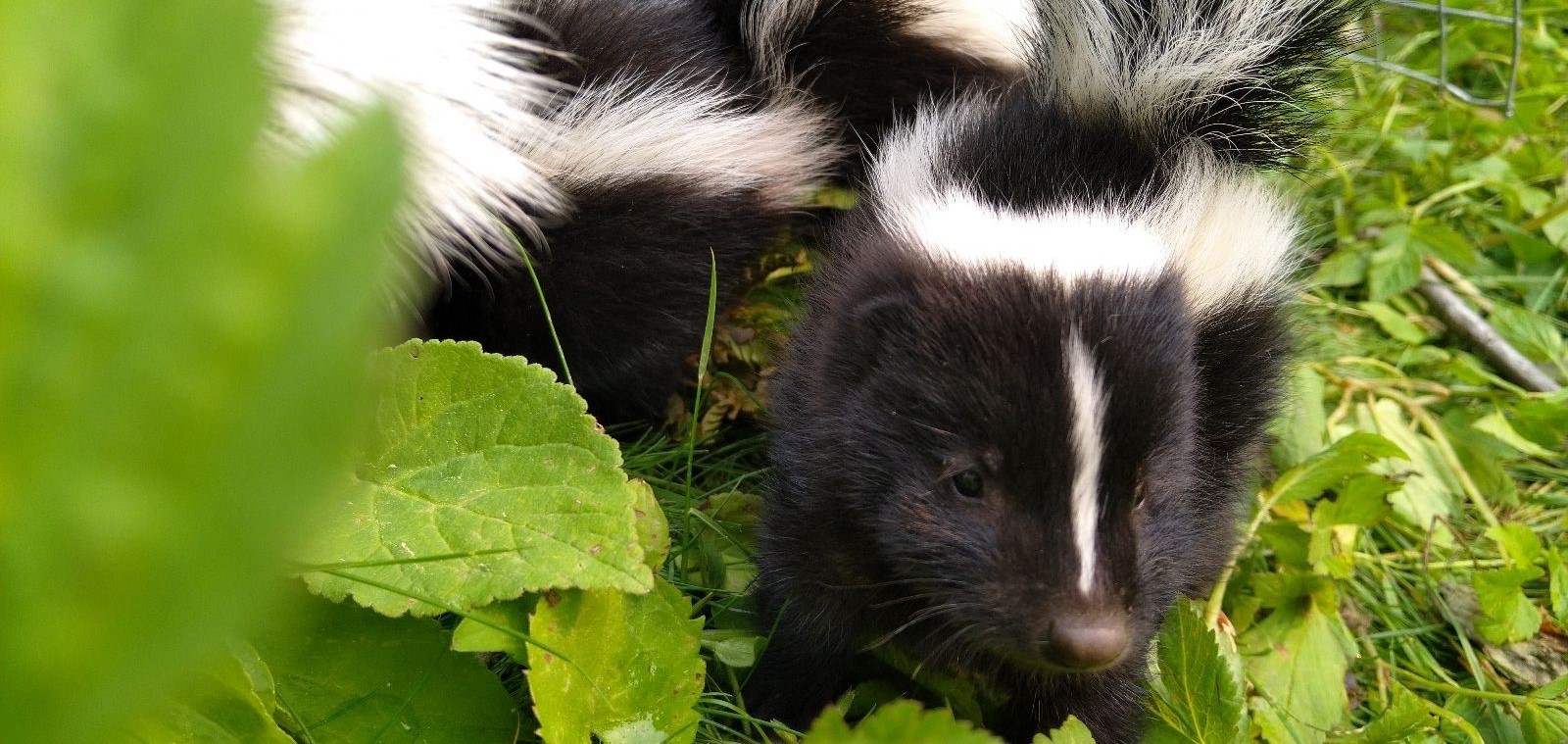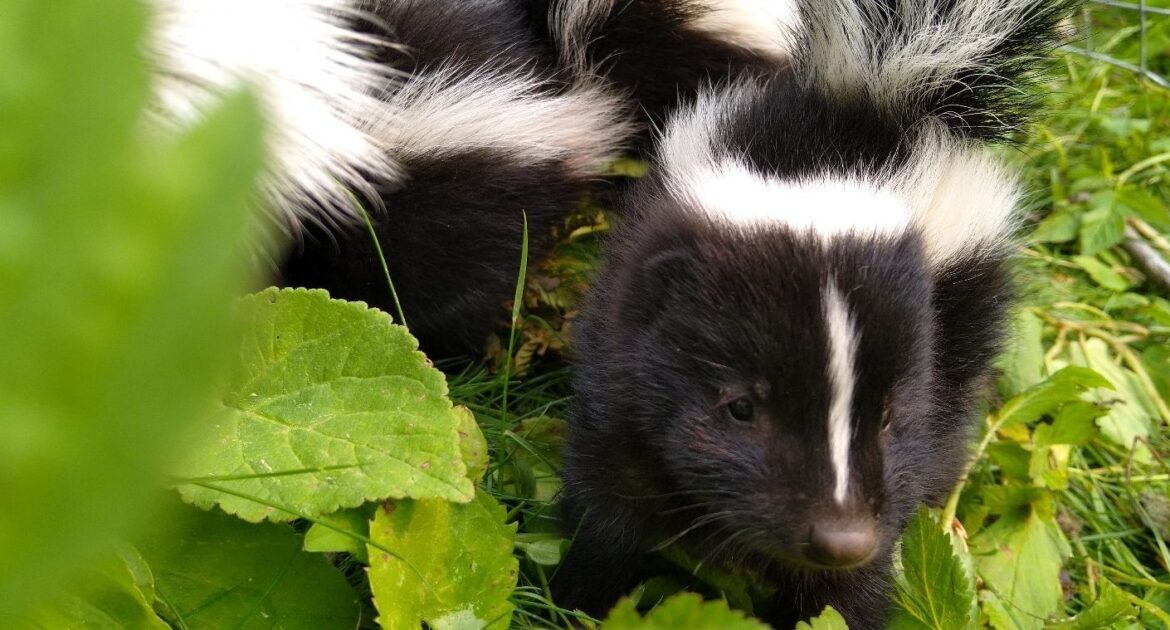Ever stumbled upon a baby skunk in your yard and felt a mix of awe and concern? These tiny, striped creatures may look harmless, but the question on everyone’s mind is, “Do baby skunks have the power to spray?”
The short answer is yes, but there’s more to the story. At Skedaddle Humane Wildlife Control in Milwaukee, we’ve seen firsthand how skunks behave and when they decide to use their infamous defense mechanism. Understanding skunk behavior facts is key to peacefully dealing with these animals.
Baby skunks, also known as kits, are born unable to spray. However, by the time they’re just a few weeks old, they develop the ability to release their pungent spray when they feel threatened. Adult skunks are famous for their powerful spray, but even young ones can surprise you if they feel cornered or scared.
That’s why proper Milwaukee wildlife control is essential when dealing with skunks on your property. Trying to handle the situation on your own could lead to some stinky consequences, so it’s best to leave it to the professionals.
Understanding Baby Skunks and Spraying Habits
Baby skunks are fascinating animals, and they develop quickly within their first few months. Here are some key facts about their behaviors:
- When They’re Born: Baby skunks are born blind and deaf, completely reliant on their mother. At this stage, they can’t spray because their scent glands haven’t fully developed yet.
- When They Begin Spraying: By about three to four weeks of age, baby skunks’ scent glands are functional. Though their aim isn’t perfect yet, they’re capable of releasing their spray.
- Why They Spray: Skunks, including babies, spray as a last resort. It’s their primary defense to protect themselves from predators or anything they perceive as a threat. If a sudden movement or noise frightens them, they may instinctively spray.
- The Warning Signs: Before spraying, skunks often provide some warning. They may stomp their front feet, lift their tail, or even turn their back to you. These behaviors are their way of saying, “Back off!”
Given these skunk behavior facts, you can see why approaching or handling baby skunks without proper precautions can quickly go wrong. That’s where trained professionals like our team come in.
Why Avoid DIY Skunk Removal?
If you think dealing with baby skunks is as simple as shooing them away or setting a trap, think again. DIY methods often backfire, especially when it comes to skunks. These animals are unpredictable, and a frightened skunk doesn’t hesitate to spray.
Here’s why professional Milwaukee wildlife control should always be your first choice:
- Skunks Are Protective: Mother skunks are extremely protective of their babies. If you get too close, you risk angering the mother, which increases your chances of getting sprayed.
- One-Way Doors Work Best: At Skedaddle, we use humane solutions like one-way doors. These specially designed doors allow skunks to leave your property without letting them return. This is a safe, effective way to remove skunks without harming them.
- Avoid Health Risks: Skunks can carry diseases such as rabies. Interacting with them directly puts you and your family at risk. Our trained team knows how to handle skunks safely and without causing harm.
It’s best to leave removal to the experts who understand these animals’ habits and behaviors. Our humane methods ensure their safe exit while protecting your property.
Signs Skunks Might Be Nearby
How do you know if skunks, particularly baby skunks, have settled on your property? Here are some signs to watch for:
- Distinct Smell: Skunks are famous for their strong odor, even if they haven’t sprayed. A lingering musky smell could indicate their presence. This smell can stick to areas like your porch, shed, or even your pets if they get too close, and it doesn’t fade quickly.
- Holes in the Yard: Skunks dig small, conical holes in search of insects and grubs. Seeing these patterns in your lawn is a telltale sign. These holes are usually shallow and scattered, making your yard look messy and uneven.
- Scratching Noises: If you hear scratching or rustling noises at night, especially under a porch or shed, you might have skunks nesting nearby. These sounds are often louder during quiet nighttime hours when these animals are most active and going about their nightly routines.
- Tracks: Skunks leave clawed footprints with five toes. If you spot these tracks in areas like soft soil or mud, you’ve likely found a clue. You might also notice a tail drag mark alongside the footprints, which is another clear sign of a skunk passing through.
If you notice any of these signs, it’s time to act quickly to prevent the problem from worsening. Ignoring an issue gives them time to settle in and could lead to increased spraying incidents.
Living Peacefully With Skunks Nearby
While no one wants skunks living too close for comfort, it’s important to remember that they play a vital role in the ecosystem. Skunks help control insect populations and eat small rodents, making them beneficial to have in the wild.
That said, here are a few tips to help reduce the chances of skunks making your property their home while avoiding unnecessary risks:
- Secure Garbage Cans: Skunks are drawn to food scraps. Use tightly sealed garbage bins to keep them from rummaging through your trash.
- Remove Attractants: Clear away fallen fruits, pet food, and birdseed from your yard. These are common food sources for skunks.
- Close Off Entry Points: Check for gaps and holes around your home that skunks could use as entryways. Seal them to discourage intrusions.
- Install Motion Lights: Bright lights can scare off skunks, as they prefer dark, quiet areas to nest.
These preventative measures can help, but if you already have these animals on your property, count on us at Skedaddle Humane Wildlife Control in Milwaukee to handle the situation ethically and effectively.
Why Skunks Spray Sparingly
It might surprise you to learn that skunks are usually reluctant to spray, even though they’re capable of doing so. Producing their iconic scent takes energy and time to replenish, so they only use their spray when absolutely necessary. Baby skunks, just like their adult counterparts, don’t want to waste this valuable resource on non-threatening situations.
Skunks give plenty of warning before using their spray, and their defensive tactics are almost theatrical. If you don’t heed their signals, though, you could end up on the receiving end of their powerful scent. Understanding this behavior helps explain why it’s so important to avoid startling them.
Experience Stress-Free Removal With Skedaddle
While baby skunks may look harmless, their ability to spray is very real. Knowing how to handle skunks and their unique behaviors is the key to keeping your property free of unwanted encounters.
At Skedaddle Humane Wildlife Control in Milwaukee, we specialize in safe, humane solutions for dealing with skunks and other wildlife. Whether it’s a family of skunks or just one roaming near your home, our team is here to help.
Need help with Milwaukee wildlife control? Request an estimate today and find out how we can safely remove skunks from your property while protecting your home and family.




